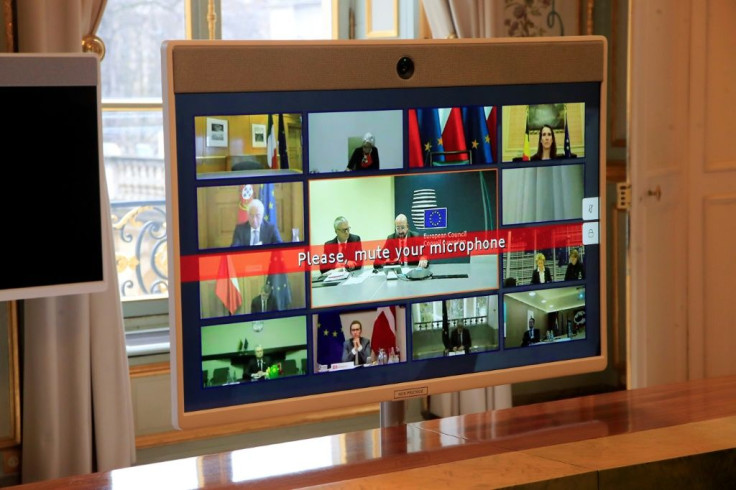Brussels Calling: Can The EU Be Run By Videolink?

The European Union runs on meetings -- endless gatherings to take decisions and try to build consensus among 27 diverse member states.
But how will the bloc cope with the coronavirus epidemic, which has forced Brussels to adopt the long distance videoconference?
Already, EU leaders and ministers have held high-level meetings on the pandemic by video conference call.
In place of the grand round table in the Europa Building summit venue, EU Council chief Charles Michel sits in front of two screens.
The screens are divided into 20 frames, through which 27 leaders sat at home in front of a variety of flags must rotate.
Next week's full EU summit in Brussels has been cancelled and replaced by a conference call at a later date.
Sessions of the European Parliament in Strasbourg have been pushed back, and Wednesday's weekly gathering of EU commissioners will be by video.
And this week's planned post-Brexit talks in London have been postponed, with EU negotiator Michel Barnier stuck in France.
Of course, many businesses and public services are adapting to working from home to slow the spread of the virus between colleagues.
But the institutions of the EU are a particular case, and some diplomats are worried that the bloc will struggle to cope.
"You can't make decisions during video conferences, it's like an informal meeting," one European diplomat told AFP.
"There's always 27 members participating," he said.
"Yesterday there was a video conference for 54 with interior and health ministers. Then you don't see anyone on the screen."
Member states expect the regular meetings of their ambassadors in Brussels to play a greater role in EU decision-making.
But they regret that their leaders will no longer be able to hold smaller side meetings to resolve problems at summits.
And they worry leaders will not be able to speak frankly when they can't be sure who is listening in on the other end of the line.
"There are now always 10 people sitting in the room. That makes several hundred people in Europe listening," the diplomat said.
"And anyone can record this and pass it on to the press. it's a completely different atmosphere."
Michel has defended the format, arguing that it has already produced "strong and clear" joint decisions to combat coronavirus.
But is it sustainable, if the crisis and national lockdowns last for months, as most health experts expect?
Pierre Sellal, a former French ambassador to the EU, said conference calls were a long-standing diplomatic practice.
"I remember the daily call between allies during the Kosovo war," he told AFP. "Video conferences are a more recent thing."
But he, like many serving diplomats who spoke on condition of anonymity, admitted that the question of confidentiality was key.
"It's a situation that can lead leaders to have more guarded and prudent language," he said.
This in turn puts more power in the hands of the meeting's chair -- in this case often Michel, president of the leaders' European Council.
The chair and his staff will have to take even more care than usual to prepare a simple agenda with clear decisions.
"It's very hard, even impossible, to organise a real debate between 27 people by alternating video messages," Sellal warned.
But if ad hoc measures like anti-virus clampdowns can be drawn up by Brussels experts before the talks, this is not the case in some areas.
The protracted debate on the long-term EU budget, the Multi-annual Financial Framework, sees leaders meeting one-on-one for private horse-trading.
And member states jealously guard their right to have their say on core sovereignty issues like migration and asylum policy, diplomats said.
And what about transparency? Before the crisis, a European summit was an opportunity for the continent's news media to quiz their leaders.
This week, with Belgium joining its neighbours in a generalised clampdown on movement, many reporters are working from home.
Briefings from EU officials take place in front of half-empty press rooms and questions are sent in by email and social media.
And no-one knows how long the situation will last.
© Copyright AFP 2024. All rights reserved.



















